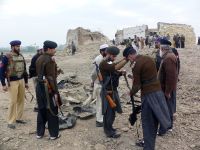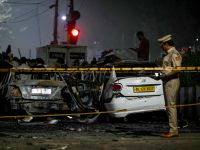Israel's right-wing opposition leader Ariel Sharon said Sunday the announcement by Prime Minister Ehud Barak of a "pause" in the Middle East peace process was not enough grounds to form an emergency coalition government.
Barak, whose political future is at stake unless he can induce opposition parties into his proposed "government of national emergency," is banking on Sharon's support to enable him to remain in office.
"The declaration of the prime minister of a pause is not sufficient," Sharon told public radio. "It is necessary to get rid of the illusions of Camp David."
The prime minister said on Friday after a day in which nine Palestinians were killed, that Israel would call an indefinite time-out in the peace process unless the Palestinians put an end to more than three weeks of violence by the time the Arab summit in Cairo closed later Sunday.
The announcement came just days after an agreement between Barak and Palestinian leader Yasser Arafat brokered by the United States at the Egyptian Red Sea resort of Sharm el-Sheikh.
Both parties agreed to take steps to end the violence in which more than 120 people have died and close on 4,000 -- mostly Palestinians -- have been injured, but so far without result.
"I am ready for an emergency government immediately, but Barak has to renounce the Camp David agreement," Sharon said. "He is trying to travel in two trains, both going in opposite directions."
Sharon has repeatedly accused Barak of making "inadmissible concessions," particularly on the question of Jerusalem, during the Camp David summit that collapsed without agreement on July 25.
The Israeli media said Barak had during the Camp David discussions agreed to withdraw from about 90 percent of the West Bank and to transfer certain parts of Jerusalem annexed in 1967 back to Palestinian control.
Analysts say that Barak's threat to withdraw Israel indefinitely from the peace process shows that the prime minister considers the process already dead and sees no option but an emergency government with the right.
He lacks a majority and faces a vote for early elections after parliament reconvenes at the end of the month.
Analysts believe he risks losing an election due to a strong shift to the right of Israeli public opinion in reaction to the Palestinian uprising – JERUSALEM (AFP)
© 2000 Al Bawaba (www.albawaba.com)







